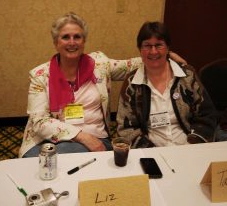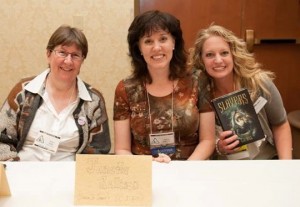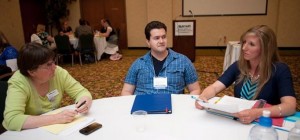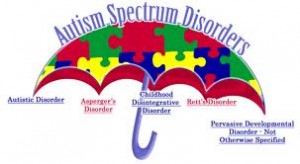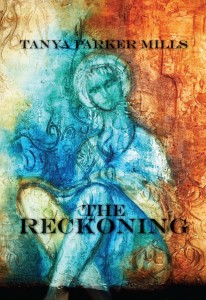Present word count of WIP: 54,620
Sorry for slacking off here. I know I missed posting last Friday and this past Monday, but I was in the middle of a terrific writer’s conference (LDS Storymakers)…and then I was still recovering from it.
(A ten-hour drive in one day is not easy, despite M&Ms and other caffeinated products, particularly after you’re coming off of five nights of only 3-5 hours of sleep on average. But an audio book leant to me by my writing/conference buddy, Liz Adair, certainly helped!)
Anyway, it was a great conference. The best thing was that I had another excuse to see my daughter. I won’t have too many more opportunities like that before she leaves on her mission. And she even came to the Whitney Awards Banquet with me (that’s become a custom…I’ll definitely miss her next year).
Liz and I were roommates again and we also kept each other company during the massive book signing (and I got to pick up a lot of tips on how to do a signing by watching our neighbor, Janette Rallison, respond to the lines and lines of fans queued up for her signature or picture).
I took part in one of the critique sessions held during the Publication Primer the day before the conference and met some terrific writers there, including David King, Rebekah Wells, and Becky Tueller and her sister, Cheryl. Our group was led by Natalie Hickman, almost due to have her baby and just out of the hospital that morning. Talk about dedication to your craft!
I pitched my WIP to Holly Root of the Waxman Literary Agency and she wants to see the first three chapters when it’s ready. YAY!!! She also said she’d have no problem taking on a client that wanted to write both Women’s Fiction and Middle Grade…all under my own name. Hmmm. Maybe I won’t need a pen name after all.
Also, I met with my editor, Linda Mullineaux, and they’re now looking at sending my book (which will be called something other than Laps) to press in August! I gave them a new suggestion for the title and I think they may go with it. But I’m not announcing it here until it’s finally approved. Anyway, I’m firmly a part of the Walnut Springs Press family, as shown by this picture of several of their authors taken after the Whitney Awards Banquet.
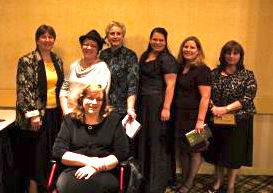
Walnut Springs Authors (Me, Angie Lofthouse, Liz Adair, Jenni James, Betsy Love, Theresa Sneed, and the injured Tristi Pinkston)
Besides the fact that I desperately need a makeover, I learned lots of great things at the LDS Storymakers Conference, as usual (particularly loved Jennifer Nielsen’s class on Middle Grade Fiction and Jeff Savage’s on Podcasts), though I didn’t get to attend nearly as many workshops or classes. That was because:
1) My body crashed after my Friday afternoon pitch . . . it’s a little too old now for these midnight film premieres (but “The Avengers” was terrific!)
and . . .
2) I volunteered to help do timekeeping for pitch sessions on Saturday morning. I can’t tell you how nice it was to be the one watching the clock rather than the one racing through my pitch over and over in my mind while waiting for the signal to go in and face the agent.
While I didn’t spend much in the bookstore, I came away with two more books to review this month. I was already set to review Jolene Perry’s Night Sky on May 14th (I just finished reading it today and have the review all written), but now I’m due to read Heather Moore’s Daughters of Jared and Tristi Pinkston’s Women of Strength, as well, before the end of the month.
Not to mention all the Whitney Award finalists and winners I’ve got downloaded. As I put in my title, it looks like all I’ll be doing the rest of this month is reading, reading, and more reading!
Originally posted 2012-05-11 13:23:28.

